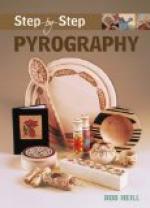The young knight met the Count’s searching glance fearlessly. “I would not take it,” he answered. “Dermot lost his realm by his own fault. There is no honor in serving him.”
“Ah,” said the Count with a quizzical lift of the eyebrow, “in that case you are very right.”
Ranulph often acted as an unofficial unrecognized envoy in state matters, and it did not surprise him when he received a message from King Henry to the effect that he was to meet the monarch at Montfaucon after the conference. Peirol, who knew every mile of the country, was to take the pigeons thither for the tournament and be Ranulph’s guide. It was altogether a very pleasant prospect for perfect summer weather.
By brisk riding the troubadour and his little companion reached Montfaucon late in the afternoon of the day following the departure of the Count’s guests. The porter, a surly looking fellow, hesitated about admitting them, and before opening the wicket gate consulted some one within. The castle seemed to be in a somewhat disorderly state. Soldiers were playing dice by the gateway, and horses were stamping and feeding in the outer bailey. Peirol was evidently taken for the troubadour’s servant, and an unkempt lad ushered them into a small room with a barred window, in one of the older towers. Ranulph was not wont to think of his own dignity, but this lack of courtesy did a little surprise him. Almost at once the youth poked his head in, without knocking, to say that the lord of the castle would see him in the great hall.
More mystified than before, Ranulph obeyed the summons, for it amounted to that. In the master’s chair sat a man of about thirty, dark-skinned, with dense black hair and eyes, one leg somewhat malformed, the knee being bowed and the foot turned slightly inward. He looked the troubadour over with a sarcastic smile. Ranulph was still in riding-dress, and might have been mistaken for a joglar or wandering minstrel, calling himself by the more dignified title of troubadour or trouvere.
“I think,” began the knight in a harsh drawl, “that one can often do no better than to tell the truth, is it not so? I am the lord of this castle--for the present. Of course I could not refuse you admittance, or you might go off and spread inconvenient rumors. I must ask you therefore to accept our hospitality unquestioning, like a courteous guest. We cannot allow you to depart until we ourselves are gone. You have your choice—to remain here quietly, alive, or to remain permanently, dead.
“Naturally you will not communicate with any ladies whom you may see, but if you can afford them some entertainment you shall be paid. They have had but a dull time thus far, I fear, and I would not have them think us barbarians, soldiers of fortune though we are. When I am through with this castle I shall leave it as I found it, except for the temporary detention of the inmates in various rooms, where I suppose they will stay until some one finds them. If anybody is found dead it will be his own fault. Now, which horn of the dilemma is your choice—troubadour?”




